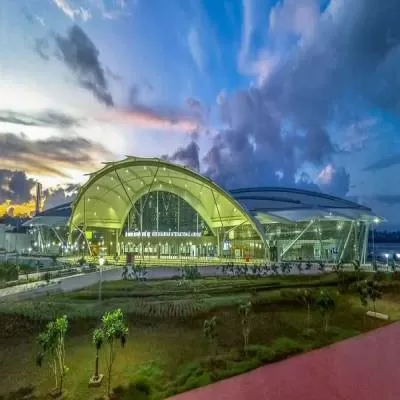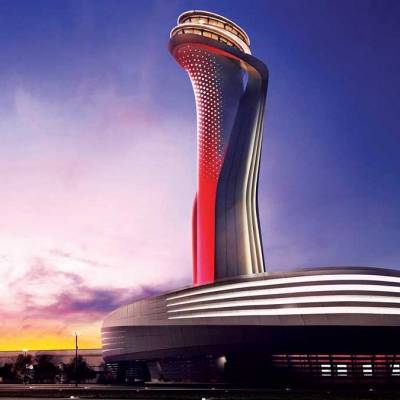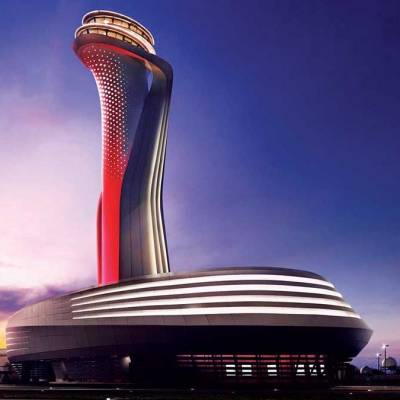- Home
- Infrastructure Transport
- AVIATION & AIRPORTS
- Adani plans to invest Rs 600 billion in airports over the next decade
Adani plans to invest Rs 600 billion in airports over the next decade
The earmarked funds will be channelled into essential airport infrastructure, including runways, taxiways, aircraft parking stands, and terminals. Additionally, Adani emphasised the importance of enhancing city-side infrastructure, such as hotels and shopping malls, to complement the airport facilities. The investment will be primarily financed through internal accruals.
Anticipating a significant shift in air traffic patterns, Adani foresees a transformation in international air travel dynamics. He predicts that airports under the Adani Group's purview will evolve into major international hubs, facilitating exponential growth in international travel.
Anticipating a significant shift in air traffic patterns, Adani foresees a transformation in international air travel dynamics. He predicts that airports under the Adani Group's purview will evolve into major international hubs, facilitating exponential growth in international travel.
Furthermore, Adani expressed the Group's commitment to fostering seamless collaboration with airlines to bolster direct domestic connectivity. "With our network of airports, we will also be able to work seamlessly with airlines to build more direct domestic connectivity," he said.
The Adani Group plans to list its airport business once it attains profitability, signalling its long-term commitment to transparency and corporate governance. The Group currently operates six airports, including Lucknow, Ahmedabad, Jaipur, Guwahati, Thiruvananthapuram, and Mangalore, following the acquisition of Mumbai and the upcoming Navi Mumbai Airport from the GVK Group in 2021.
Arun Bansal, CEO of Adani Airport Holdings, outlined the Group's ambitious vision to accommodate 250 to 300 million passengers by 2040 across its eight airports. This projection reflects a substantial increase from the current capacity of approximately 73 million passengers served by the operational airports.
"Only around 300 million Indians out of a 1.4 billion population are flying today," Bansal said. "Fleet orders placed by airlines indicate that 700 planes that are in the Indian civil aviation fleet will rise to 3,000 by 2030."
The Adani Group's airport business has garnered keen investor interest and is positioned as a cornerstone of its consumer-oriented portfolio. In the fiscal year 2023-24, airport revenue surged by 35% to Rs 57.487 billion, with EBITDA rising by 27% to Rs 17.74 billion during the same period.
As part of its ongoing capacity expansion efforts, the Adani Group inaugurated a new terminal at Lucknow, capable of accommodating 80 million passengers annually. As confirmed by Bansal, future expansion plans include the development of the Navi Mumbai Airport and a new terminal at Guwahati Airport.
Looking ahead, Adani emphasised the Group's focus on elevating airport infrastructure and technology to global standards before considering a separate listing on the exchanges, although no specific timeline was provided. ?
Karan Adani, Managing Director of Adani Ports & SEZ Ltd, has unveiled the Adani Group's plan to invest Rs 600 billion in its airport business over the next decade. This investment excludes the Rs 180 billion already allocated for constructing the initial phase of the Navi Mumbai airport. The earmarked funds will be channelled into essential airport infrastructure, including runways, taxiways, aircraft parking stands, and terminals. Additionally, Adani emphasised the importance of enhancing city-side infrastructure, such as hotels and shopping malls, to complement the airport facilities. The investment will be primarily financed through internal accruals. Anticipating a significant shift in air traffic patterns, Adani foresees a transformation in international air travel dynamics. He predicts that airports under the Adani Group's purview will evolve into major international hubs, facilitating exponential growth in international travel. Anticipating a significant shift in air traffic patterns, Adani foresees a transformation in international air travel dynamics. He predicts that airports under the Adani Group's purview will evolve into major international hubs, facilitating exponential growth in international travel. Furthermore, Adani expressed the Group's commitment to fostering seamless collaboration with airlines to bolster direct domestic connectivity. With our network of airports, we will also be able to work seamlessly with airlines to build more direct domestic connectivity, he said. The Adani Group plans to list its airport business once it attains profitability, signalling its long-term commitment to transparency and corporate governance. The Group currently operates six airports, including Lucknow, Ahmedabad, Jaipur, Guwahati, Thiruvananthapuram, and Mangalore, following the acquisition of Mumbai and the upcoming Navi Mumbai Airport from the GVK Group in 2021. Arun Bansal, CEO of Adani Airport Holdings, outlined the Group's ambitious vision to accommodate 250 to 300 million passengers by 2040 across its eight airports. This projection reflects a substantial increase from the current capacity of approximately 73 million passengers served by the operational airports. Only around 300 million Indians out of a 1.4 billion population are flying today, Bansal said. Fleet orders placed by airlines indicate that 700 planes that are in the Indian civil aviation fleet will rise to 3,000 by 2030. The Adani Group's airport business has garnered keen investor interest and is positioned as a cornerstone of its consumer-oriented portfolio. In the fiscal year 2023-24, airport revenue surged by 35% to Rs 57.487 billion, with EBITDA rising by 27% to Rs 17.74 billion during the same period. As part of its ongoing capacity expansion efforts, the Adani Group inaugurated a new terminal at Lucknow, capable of accommodating 80 million passengers annually. As confirmed by Bansal, future expansion plans include the development of the Navi Mumbai Airport and a new terminal at Guwahati Airport. Looking ahead, Adani emphasised the Group's focus on elevating airport infrastructure and technology to global standards before considering a separate listing on the exchanges, although no specific timeline was provided. ?




















